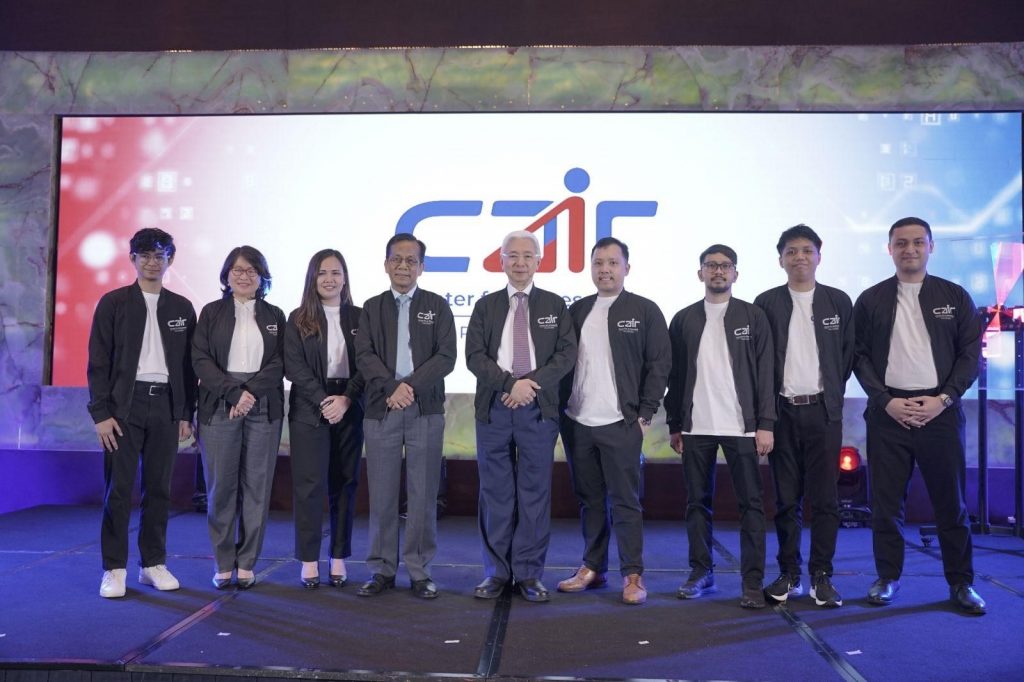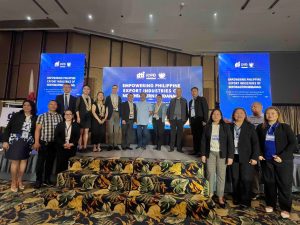
Mandaluyong, Philippines—The Department of Trade and Industry (DTI) took a significant step towards an artificial intelligence (AI)-powered future for the Philippines with the launch of the National AI Strategy Roadmap 2.0 (NAISR 2.0) and the Center for AI Research (CAIR), 03 July 2024.
Under the mandate of Republic Act No. 11981 or the Tatak Pinoy Act (Proudly Filipino Act) and supported by the Asian Development Bank, these initiatives aim to drive innovation, bolster the economy, and improve the lives of Filipinos through strategic AI adoption.
National AI Strategy Roadmap 2.0
Building on the foundation of the 2021 AI roadmap, the NAISR 2.0 incorporates new technologies like generative AI to harness new opportunity for the Philippine economy and enhance the lives of its citizens. This forward-thinking strategy adapts to the rapidly changing AI landscape, incorporating emerging themes like ethics and governance to ensure responsible and beneficial AI deployment.
The NAISR 2.0 seeks to address critical challenges hindering AI adoption in the country, including limited use cases of AI, limited human and physical resources within industries, the difficulties faced by enterprises in developing data strategies, and the uncertainties surrounding AI regulation and legal frameworks.
To accelerate the integration of AI, NAISR 2.0 prioritizes increasing the national research and development (R&D) budget to the UNESCO-recommended target of 1% of grose domestic product (GDP), a crucial step in fostering economic transformation. Currently, the Philippine Gross Expenditure on R&D stands at a mere 0.30% of GDP.
Additionally, upskilling and reskilling the workforce to meet the growing demand for AI and data science professionals remains a top priority. These initiatives aim to enhance the Philippines’ capacity for innovation and technological advancement, ultimately improving the lives of its citizens.
To realize the country’s huge AI vision and goals, the NAISR 2.0 outlines seven strategic imperatives: establishing a robust, connected, and networked environment; improving data access and value extraction; transforming education and nurturing future AI talent; upskilling and reskilling the workforce; fostering an AI ecosystem that prioritizes ethical considerations; mastering and pushing the boundaries of AI research and development; and accelerating innovation through the strategic application of AI technologies.
“The success of NAISR 2.0 is anchored on the implementation of a whole-of-nation approach. This necessitates breaking down silos that hinder collaboration across various sectors and stakeholders, including government, industry, academia, and civil society,” said DTI Secretary Fred Pascual.
Center for AI Research
The DTI is also championing the CAIR as a leading Center of Excellence for AI R&D. DTI Competitiveness and Innovation Group Undersecretary Rafaelita M. Aldaba emphasized the CAIR’s dedication to positioning the Philippines as a global leader in AI-driven innovation and investment.
The CAIR’s vision is to harness AI’s transformative power to address pressing societal and industrial challenges, fuel economic growth, and promote inclusive development. It actively explores AI, Machine Learning, and GenAI solutions from Amazon Web Services, seeking to enhance government and citizen services, beginning with healthcare and expanding into agriculture by 2024.
In parallel, the DTI is engaging with AI Singapore to explore R&D solutions tailored to the unique challenges faced by Southeast Asian industries. This collaboration aligns with the CAIR’s goal to create global links and elevate the Philippines’ contribution to boosting technological capabilities of industries across the region.
The monumental launch of the CAIR, the first AI hub in the Philippines, brings together a team of pioneering experts who will spearhead the CAIR’s initiatives and drive its mission forward. Led by Chief AI and Data Officer, Dr. Erika Fille Legara, and Deputy Chief AI and Data Officer, Dr. Sebastian Ibañez; the team also includes accomplished Data Scientists such as Mr. Jose Marie Antonio Minoza, Dr. Alvin Alon, Mr. Sebastian Felipe Bundoc, and Mr. Christian Villarin.
Through technological innovation, multidisciplinary research, and the development of research personnel, the CAIR promotes socio-economic R&D, enhances scientific knowledge, and strengthens the country’s technological competitiveness and provides AI solutions for regional challenges such as sustainable agriculture, urban planning, and disaster resilience.
Partner agencies, along with representatives from technology companies and the private sector, expressed their strong support for the CAIR and NAISR 2.0. They emphasized the importance of responsible AI adoption in enhancing public services and improving the lives of Filipinos. This collaborative effort demonstrates a shared commitment to leveraging AI for the benefit of society while ensuring ethical and equitable implementation.
“We will harness the power of AI to create solutions that are not only groundbreaking but also inclusive and beneficial to all. Together, we are building a future where AI drives our nation’s progress and ensures the inclusive development of all stakeholders,” the trade chief said as he called for continued support to ensure the initiatives’ long-term success
The inaugural event featured a panel discussion titled “Balancing AI Innovation and Responsible AI Adoption,” where prominent AI leaders from diverse sectors shared their insights. The discussion focused on current trends, challenges, and opportunities in the field of AI—fostering a dialogue on the responsible and ethical development of AI technologies. ♦
Date of release: 05 July 2024










